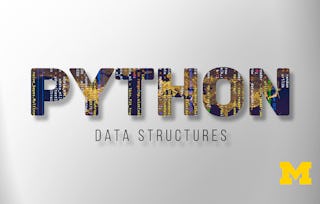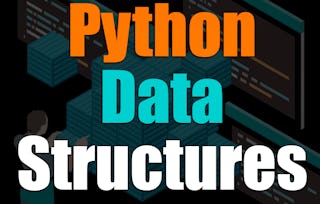This course provides an in-depth exploration of Python’s four built-in data structures: lists, tuples, sets, and dictionaries. Each structure will be introduced in detail, focusing on how to create, access, and manipulate them efficiently. The course will emphasize their unique characteristics and appropriate use cases. Learners will also apply their understanding in a case study, showcasing the practical application of these data structures to solve real-world problems.

BiteSize Python for Absolute Beginners: Data Structures

BiteSize Python for Absolute Beginners: Data Structures
This course is part of BiteSize Python for Absolute Beginners Specialization

Instructor: Di Wu
Access provided by ITC-Infotech
What you'll learn
Evaluate the strengths and weaknesses of different Python data structures and apply them to solve practical problems
Implement various operations on Python data structures, such as accessing, slicing, modifying, and using comprehensions
Understand the characteristics and uses of core Python data structures, including lists, tuples, sets, and dictionaries.
Skills you'll gain
Details to know

Add to your LinkedIn profile
4 assignments
See how employees at top companies are mastering in-demand skills

Build your subject-matter expertise
- Learn new concepts from industry experts
- Gain a foundational understanding of a subject or tool
- Develop job-relevant skills with hands-on projects
- Earn a shareable career certificate

There are 5 modules in this course
This module introduces the list as a built-in data structure in Python. It covers the basics of what a list is, how to create lists, including heterogeneous lists (lists containing different data types), and how to access, slice, and manipulate them. Additionally, learners will explore list comprehension, a powerful Pythonic way to work efficiently with lists.
What's included
5 readings1 assignment10 ungraded labs
This module explores the tuple, a built-in data structure in Python. It covers what a tuple is, how to create one, and how to work with heterogeneous tuples (containing elements of different types). Learners will learn how to access elements by index and through iteration, slice tuples, and understand the concept of tuple comprehension for efficient data handling.
What's included
2 readings1 assignment6 ungraded labs
This module introduces the set, a built-in data structure in Python that stores unique, unordered elements. It covers what a set is, how to create one, and how to manage elements within a set. The module also explores set operations (such as union, intersection, and difference), common set methods, and set comprehension for efficient data manipulation.
What's included
2 readings1 assignment5 ungraded labs
This module focuses on the dictionary (dict), a built-in Python data structure that stores key-value pairs. It covers what a dictionary is, how to create one, and how to access its elements using keys. Learners will explore common dictionary methods to manipulate data, and the module concludes with an introduction to dictionary comprehension for efficient data creation and processing.
What's included
2 readings1 assignment4 ungraded labs
In this module, students will apply their knowledge of Python’s built-in data structures—list, tuple, set, and dictionary—by working on a real-life case study involving a grade book for students. They will use each of the data structures to store and manipulate the grade data, allowing them to practice and improve their understanding while comparing the advantages and limitations of each structure.
What's included
4 ungraded labs
Earn a career certificate
Add this credential to your LinkedIn profile, resume, or CV. Share it on social media and in your performance review.
Instructor

Offered by
Why people choose Coursera for their career

Felipe M.

Jennifer J.

Larry W.

Chaitanya A.
Explore more from Data Science

University of Michigan




